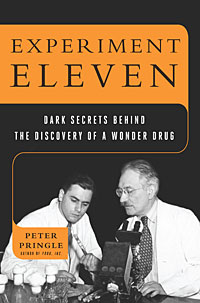 Although we hardly think about it now, tuberculosis was the scourge of industrialized nations in the 19th and early 20th centuries. Worse yet, there was no known cure, and mortality due to the disease was exceptionally high.
Although we hardly think about it now, tuberculosis was the scourge of industrialized nations in the 19th and early 20th centuries. Worse yet, there was no known cure, and mortality due to the disease was exceptionally high.
Seventy years ago on October 19, 1943, Albert Schatz, a young scientist and graduate student in the laboratory of Selman A. Waksman, a professor at Rutgers’ College of Agriculture, discovered the antibiotic streptomycin. It was hailed as a medical miracle for its ability to control and defeat tuberculosis.
The discovery is just the beginning of the story of streptomycin as laid out by author Peter Pringle in his latest work, Experiment Eleven: Dark Secrets Behind the Discovery of a Wonder Drug. In his book, Pringle chronicles the deliberate exclusion of Schatz from the laurels surrounding the discovery, including the awarding of the coveted Nobel Prize for Physiology or Medicine given solely to Waksman in 1952.
Pringle is coming to the Archibald S. Alexander Library on College Avenue at 5 p.m. on Wednesday, October 2, to talk about his book, as a special guest of Executive Dean Bob Goodman of the School of Environmental and Biological Sciences, and Marianne Gaunt, vice president for information services and university librarian. A reception and book-signing will follow the talk. Further details are on the Discovery website of the Office of Community Engagement.
Pringle uses his talents as a former investigative reporter to unearth details about the early lives of Waksman and Schatz, about the research team’s collaborations with other well-known institutions, about the influence of an emerging pharmaceutical industry, and about the role of Rutgers University in the subsequent recognition and royalties controversy.
Pringle was a foreign correspondent for 30 years for The Sunday Times (London), The Observer (UK) and The Independent (UK). He is author of several books, including Food, Inc., The Murder of Nikoli Vavilov, the novel Day of the Dandelion, the best-seller Those Are Real Bullets, Aren’t They?, among many others.
The Experiment Eleven lecture and book-signing are free of charge and open to the public. Refreshments will be served. Space for this event is limited, so registration is strongly recommended.

